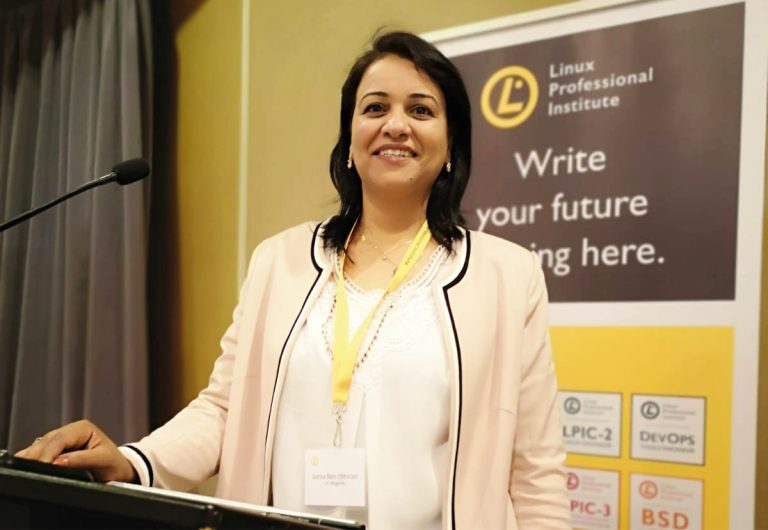Sonia Ben Othman: Achieving Equity and Supporting Growth for Women and Girls in FOSS

Part of the Linux Professional Institute (LPI) mission of “promoting the use of open source by supporting the people who work with it” is facilitating equity. Supporting the adoption of FOSS and professional development of those that use it, in turn, allows Linux professionals to aid their communities, and creates opportunities for international development where access to IT may otherwise be infeasible.
Women are a vital part of the history of free and open source software – and its future. On this International Women’s Day, we publish the following interview to celebrate the contributions women have made to FOSS and to Information and Communication Technologies for Development (ICT4D), as well as gain insight into what supports can help create change within an environment that can pose challenges to the bright and capable minds that help develop it. We had the privilege of interviewing a member of the LPI team with experience both building her career as a woman in FOSS and helping women succeed through open source in North Africa.
Sonia Ben Othman is the LPI Partner Development & Success Manager for Maghreb, a region with existing barriers to gender equity and rights and freedoms for women. In addition to being a valuable member of the LPI team, and a supportive colleague who has approached all of our interactions with warmth, her path provides key insights into how FOSS can uniquely contribute to autonomy and professional success for women in developing regions. A transcription of our interview follows.
Thanks for meeting today to share your thoughts on how we can support equity in the FOSS community, and celebrate the success of women in IT! To start, can you share your professional and/or academic background?
Thank you for giving me the opportunity for an interview, and I appreciate your consideration and interest in me. I have a Master’s degree in Educational Technologies, have been part of the LPI Maghreb team since 2006, and I currently Partner Development & Success Manager at Linux Professional Institute. I run a Linux training and certification company based in Tunisia, founded in 2004. I have also been professionally involved in national and international projects with universities in North Africa and France through the university networks as a professional and as a volunteer.
Tell us about your path in free and open source software; how you first became involved and where you are now.
I started to get interested in open source software when I did my Master’s degree in new educational technologies. My surprise was great when I discovered the accessibility and ease of working with these tools!
What has your experience been as a woman in IT and/or FOSS communities?
In the beginning, they [those in positions of authority] will tell you that you are not doing it right because you do not know enough and that they should do it for you. But I persisted and took the time to learn and ended up running projects on a national as well as international level.
Describe the relationship between FOSS and women you have seen in your career. How can FOSS and ICT help empower women, and in turn, how have women students and professionals succeeded in and/or contributed to FOSS?
FOSS and ICT continue to grow by leaps and bounds. This sector has a lot to offer, including numerous job opportunities, competitive salaries, work/life balance, and more. These are the major factors that encourage women to learn FOSS, to find a better job, and to be economically independent.
What changes would you like to see to the open source community to make it more encouraging and inclusive to women? Are these the same changes you would make to IT overall?
We should create safe online spaces where girls can access reliable information tailored to them, discover valuable services in their area, and connect with other professional women facing and overcoming the same challenges. The goal is to boost self-confidence and empower girls to pursue work in the IT sector.
Are there any specific resources or organizations you have had positive experiences with and would recommend to women interested in IT and FOSS?
I had the pleasure of collaborating with the international organization of the Francophonie through the Francophone Fund. I was sponsored to create a Moodle platform and to give free courses on system and network administration under Linux for the French-speaking countries. These courses drew more than six thousand participants.
Do you have any advice or encouragement for young women looking to become involved in IT?
The IT sector is dynamic and is evolving rapidly. It can be said that societal changes and innovation are progressing at about the same pace as the adoption and use of ICT in everyday life and work. This is driving the creation of ICT jobs, which are incredibly diverse and include a wide variety of options from jobs specializing in the production and management of ICTs to jobs that rely heavily and directly on ICTs to manufacture or produce goods.
The ICT sector remains a very attractive market, providing employment and income opportunities for skilled and qualified women. So the only option that we have as women is learning and learning!
Sonia Ben Othman is just one of the many talented women professionals, both within LPI and outside of it, that contribute to FOSS and ICT4D around the world. Science and technology is a field where all individuals, regardless of identity, should have the opportunity to work, contribute and thrive. LPI is delighted to welcome more people to become part of the free and open community. We hope through the celebration of success and consideration of different perspectives to shape the future of open source, we can continue to encourage an equitable environment for everyone in FOSS – “promoting the use of open source by supporting the people that work with it”.